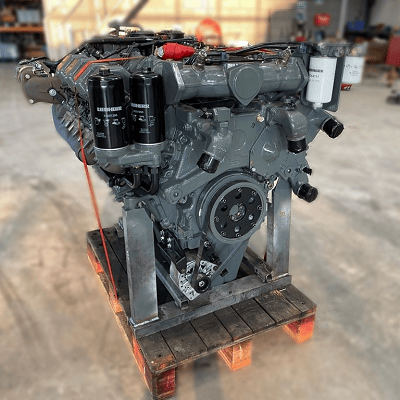When it comes to heavy machinery, reliability and power are paramount. Liebherr, a name synonymous with innovation and excellence in engineering, stands tall as a pioneer in the realm of heavy equipment and machinery. From towering cranes to robust excavators, Liebherr’s engineering prowess extends to the heart of these machines. We delve into the world of dyno testing a Liebherr engine, uncovering the meticulous process behind unleashing the raw power concealed within. Before we embark on the journey of dyno testing, it’s crucial to understand the foundation upon which Liebherr engines are built. With decades of engineering expertise and commitment to quality, Liebherr engines are crafted to withstand the most demanding environment and deliver unparalleled performance. Each component is meticulously designed and rigorously tested to ensure reliability, efficiency and longevity. 1 Preparation: The engine undergoes meticulous preparation before being mounted onto the dynamo meter. This includes ensuring all connections are secure, fluids are filled to the appropriate levels, and sensors are properly calibrated. 2 Mounting: The engine is carefully mounted onto the dynamometer, a specialized device designed to simulate real-world operating conditions. Precision is paramount during this step to ensure accurate results. 3 Initial checks: Once mounted, a series of initial checks are conducted to verify proper alignment, connection integrity, and functionality of all engine systems. 4 Warm-up: The engine is started and allowed to warm up to operating temperature. This ensures consistent results and minimizes the risk of damage during testing. 5 Baseline testing: With the engine warmed up , baseline tests are conducted to establish initial performance metrics. This includes measuring power output, torque, fuel consumption, and emissions at various RPM levels. 6 Load testing: The engine is subjected to progressively increasing loads to simulate different operating conditions, such as idle, partial load and full load. This allows engineers to assess performance across the entire operating range and identify any potential issues or optimization. 7 Data analysis: Throughout the testing process, data is continuously collected and analyzed in real-time. Advanced instrumentation and software are used to monitor performance metrics and identify trends or anomalies. 8 Optimazation: Based on the data analysis, adjustments may be made to optimize engine performance. This could involve fine-tuning fuel injection timing, adjusting air-fuel ratios, or optimize turbocharger boost pressure. 9 Validation: Once testing is complete, the results are meticulously reviewed and validated against predetermined criteria and specifications. Any deviations or anomalies are thoroughly investigated to ensure accuracy and reliability. 10 Reporting: Finally, a comprehensive report is generated detailing the results of the dyno testing, including performance metrics, observations, and any recommendations for further optimization or refinement. Dyno testing a Liebherr engine is more than just a routine procedure – it’s a testament to the unwavering commitment to excellence that defines Liebherr’s engineering philosophy. By subjecting their engines to rigorous testing and analysis, Liebherr ensures that each engine delivers the uncompromising performance, reliability, and efficiency that customers expect. In conclusion, dyno testing a Liebherr engine is not just about measuring power output. It’s about unlocking the true potential of these remarkable engines and ensuring they exceed expectations in the most challenging environments imaginable. Radiator Aluminium Profile Extrusion Dies
At present, aluminum profile radiators are widely used in fields such as automobiles, electronic equipment, lighting equipment, etc.;
The aluminum radiator shell is one of the most important components of the radiator. Its main function is to protect the internal heat dissipation components and strengthen the structure of the entire radiator. Today I will take you to learn about the application of radiators and their shells.
Aluminum profiles are a common material for manufacturing radiator shells. They have the advantages of being lightweight, corrosion-resistant, and easy to maintain. In the processing and manufacturing process, stamping, hot pressing, processing, spraying and other technologies are usually used;
When designing an aluminum radiator shell, engineers usually consider the following aspects: shell size, cooling power, fan configuration, and installation method;
This can provide users with a more efficient, safe and reliable one-stop cooling solution.
Advantages of aluminum alloy radiator
1.Lightweight: Due to the lightweight characteristics of aluminum alloy materials, aluminum alloy radiators are lighter than traditional copper radiators, which can reduce the overall weight of mechanical equipment.
2.Good corrosion resistance: Aluminum alloy radiators have excellent oxidation resistance and anti-corrosion properties, and are not prone to rust or oxidation problems after long-term use.
3.Simple manufacturing process: The manufacturing process of aluminum alloy radiators is relatively simple, the production cost is low, and large quantities of products can be produced more cheaply.
Radiator Aluminium Profile Extrusion Molds,Radiator Aluminium Profile Extrusion Moulds,Radiator Profile Extrusion Dies,Radiator Aluminium Extrusion Dies Foshan Jieliwei Metal Products Co., Ltd. , https://www.foshanjlw.com
The process of a dyno test on a Liebherr engine

The foundation of excellence
The process
The outcome of dyno testing
window.authenticationPopup = {"autocomplete":"off","customerRegisterUrl":"https:\/\/www.cranepartssupply.com\/en\/customer\/account\/create\/","customerForgotPasswordUrl":"https:\/\/www.cranepartssupply.com\/en\/customer\/account\/forgotpassword\/","baseUrl":"https:\/\/www.cranepartssupply.com\/en\/","customerLoginUrl":"https:\/\/www.cranepartssupply.com\/en\/customer\/ajax\/login\/"}
{
"#authenticationPopup": {
"Magento_Ui/js/core/app": {"components":{"authenticationPopup":{"component":"Magento_Customer\/js\/view\/authentication-popup","children":{"messages":{"component":"Magento_Ui\/js\/view\/messages","displayArea":"messages"},"captcha":{"component":"Magento_Captcha\/js\/view\/checkout\/loginCaptcha","displayArea":"additional-login-form-fields","formId":"user_login","configSource":"checkout"}}}}} },
"*": {
"Magento_Ui/js/block-loader": "https\u003A\u002F\u002Fwww.cranepartssupply.com\u002Fstatic\u002Fversion1728988868\u002Ffrontend\u002FComaxx\u002FPartsSupply\u002Fen_US\u002Fimages\u002Floader\u002D1.gif"
}
}
{
"*": {
"Magento_Customer/js/section-config": {
"sections": {"stores\/store\/switch":["*"],"stores\/store\/switchrequest":["*"],"directory\/currency\/switch":["*"],"*":["messages"],"customer\/account\/logout":["*","recently_viewed_product","recently_compared_product","persistent"],"customer\/account\/loginpost":["*"],"customer\/account\/createpost":["*"],"customer\/account\/editpost":["*"],"customer\/ajax\/login":["checkout-data","cart","captcha"],"catalog\/product_compare\/add":["compare-products"],"catalog\/product_compare\/remove":["compare-products"],"catalog\/product_compare\/clear":["compare-products"],"sales\/guest\/reorder":["cart"],"sales\/order\/reorder":["cart"],"checkout\/cart\/add":["cart","directory-data"],"checkout\/cart\/delete":["cart"],"checkout\/cart\/updatepost":["cart"],"checkout\/cart\/updateitemoptions":["cart"],"checkout\/cart\/couponpost":["cart"],"checkout\/cart\/estimatepost":["cart"],"checkout\/cart\/estimateupdatepost":["cart"],"checkout\/onepage\/saveorder":["cart","checkout-data","last-ordered-items"],"checkout\/sidebar\/removeitem":["cart"],"checkout\/sidebar\/updateitemqty":["cart"],"rest\/*\/v1\/carts\/*\/payment-information":["cart","last-ordered-items","captcha","instant-purchase"],"rest\/*\/v1\/guest-carts\/*\/payment-information":["cart","captcha"],"rest\/*\/v1\/guest-carts\/*\/selected-payment-method":["cart","checkout-data"],"rest\/*\/v1\/carts\/*\/selected-payment-method":["cart","checkout-data","instant-purchase"],"customer\/address\/*":["instant-purchase"],"customer\/account\/*":["instant-purchase"],"vault\/cards\/deleteaction":["instant-purchase"],"persistent\/index\/unsetcookie":["persistent"],"review\/product\/post":["review"],"wishlist\/index\/add":["wishlist"],"wishlist\/index\/remove":["wishlist"],"wishlist\/index\/updateitemoptions":["wishlist"],"wishlist\/index\/update":["wishlist"],"wishlist\/index\/cart":["wishlist","cart"],"wishlist\/index\/fromcart":["wishlist","cart"],"wishlist\/index\/allcart":["wishlist","cart"],"wishlist\/shared\/allcart":["wishlist","cart"],"wishlist\/shared\/cart":["cart"],"catalog\/customproduct\/add":["cart"],"braintree\/paypal\/placeorder":["cart","checkout-data"],"braintree\/googlepay\/placeorder":["cart","checkout-data"]},
"clientSideSections": ["checkout-data","cart-data"],
"baseUrls": ["https:\/\/www.cranepartssupply.com\/en\/"],
"sectionNames": ["messages","customer","compare-products","last-ordered-items","cart","directory-data","captcha","instant-purchase","loggedAsCustomer","persistent","review","wishlist","recently_viewed_product","recently_compared_product","product_data_storage"] }
}
}
{
"*": {
"Magento_Customer/js/customer-data": {
"sectionLoadUrl": "https\u003A\u002F\u002Fwww.cranepartssupply.com\u002Fen\u002Fcustomer\u002Fsection\u002Fload\u002F",
"expirableSectionLifetime": 61,
"expirableSectionNames": ["cart","persistent"],
"cookieLifeTime": "3600",
"updateSessionUrl": "https\u003A\u002F\u002Fwww.cranepartssupply.com\u002Fen\u002Fcustomer\u002Faccount\u002FupdateSession\u002F"
}
}
}
{
"*": {
"Magento_Customer/js/invalidation-processor": {
"invalidationRules": {
"website-rule": {
"Magento_Customer/js/invalidation-rules/website-rule": {
"scopeConfig": {
"websiteId": "1"
}
}
}
}
}
}
}
{
"body": {
"pageCache": {"url":"https:\/\/www.cranepartssupply.com\/en\/page_cache\/block\/render\/page_id\/268\/","handles":["default","cms_page_view","cms_page_view_id_the-process-of-a-dyno-test-on-a-liebherr-engine"],"originalRequest":{"route":"cms","controller":"page","action":"view","uri":"\/en\/the-process-of-a-dyno-test-on-a-liebherr-engine"},"versionCookieName":"private_content_version"} }
}